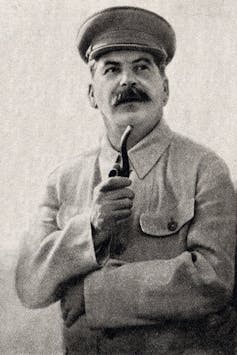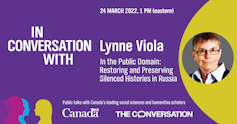Vladimir Putin’s military aims, whether based on an attempt to restore the imperial grandeur of Russia or traditional Russian territorial paranoia, have resulted in the human tragedy of war unfolding before the world in Ukraine.
Putin’s desires to reclaim what he sees as lost Russian territory have also extended to the realm of history, most recently with the most absurd and inaccurate claims about Ukraine’s history and statehood.
Although Putin’s historical revisionism has been most intense around issues surrounding the Second World War and the supposed historical justification for “reunion” with Ukraine, it has also had a profound effect on another aspect of Russian history that hasn’t received as much attention — the study of Stalinist repression in the Soviet Union.
Last December, Russia’s Supreme Court liquidated the International Memorial Society. Known as Memorial, it was founded in the late 1980s and was dedicated to the preservation of the memory of the victims of former Soviet premier Josef Stalin’s vicious reign of terror who were sent to the Gulag prison camps in the 1930s.
The Supreme Court justified its decision by reference to the “foreign agents” law of 2012 that sought to penalize any Russian organization that received financial assistance from abroad.
A vast archive on the Gulag
As it evolved, Memorial became both a vast archive of Gulag documentation as well as an important human rights organization. The liquidation of Memorial, which holds the world’s largest archive on Stalinist repression and the Gulag, is only one of the more egregious examples of Putin’s revisionism.
Author Lynne Viola will discuss her research into Soviet-era persecution during a live event on March 24 co-sponsored by The Conversation and the Social Sciences and Humanities Research Council.
The closure of Memorial was accompanied by a wave of arrests of dissident voices in Russia at the same time Russia was readying its forces for the invasion of Ukraine.
Putin’s war on the history of his own country is many years in the making.
Almost as soon as Putin came into power in 1999 — and well before the rest of the world had any notion of how his regime would evolve — the FSB (Russia’s main intelligence service and the successor to the KGB) made visits to at least four central archives in Moscow, frightening the staff and putting people on notice that the “golden age” of open Russian archives was nearing its end.
Although the archives did not close, some documents were reclassified and it became more difficult for foreign researchers to collaborate with their Russian colleagues in archival projects. The FSB archive, along with the highly secretive “Kremlin” or “Presidential” archive, remained largely closed — and absolutely closed to foreigners.
When foreign historians were welcome
In the 1990s, no one could have predicted this offensive against history. On the contrary, the 1990s were a time when the archives were opening and Russian and foreign historians began to work together for the first time.

Putin’s government has made it more difficult for historians to delve into Russian state archives about the actions of former Soviet dictator Josef Stalin.
For more than 30 years, I have been researching the political and social history of Russia, including violence in the era of Stalin. I remember those heady days when I would go into the Russian State Economic Archives to work and end up drinking tea all day as historian after historian arrived to meet me.
Soon, a group of older and very distinguished historians of the Soviet peasantry took me under their wing, inviting me to participate in an international collaborative project dedicated to the research, declassification and publication of key documents on the Soviet countryside between 1927 and 1939. This group even secured access to the FSB archives, which proved to be a very rich source of research.
Together, we published six volumes of documents. We documented the repression of the Soviet peasantry, discovering a vast peasant rebellion to the Soviet state during agricultural collectivization — a key Stalin initiative to control agriculture and the peasantry.
Unearthed key documents
We also unearthed key documents on the 1932-33 famine — known as the Holodomar — that killed millions of people in Ukraine and other Soviet regions. And other documents were found that revised history’s understanding of Stalin’s Great Terror at the end of the 1930s.
For my Russian colleagues, this project was a labour of immense importance.
Most of the group had been born and raised in peasant villages, had served on the front during the Second World War and had begun writing history and publishing documents during the relatively liberal years of the Khrushchev period from the mid-1950s to the mid-‘60s.
V.P. Danilov, the most distinguished of the group, was forced into silence when Leonid Brezhnev replaced Khrushchev in 1964, at one point expecting to be arrested.
When I met Danilov in the 1990s, he communicated to me the urgency of publishing archival documents, arguing that “anything could happen” in the following years. An authoritarian government could return and silence historians, he said, so our goal was to place these documents in the public domain.
At the time, I only half believed him. As it turns out, Danilov’s warnings were prescient — and continue to be so.
Access more difficult
As I continued my work in the archives into the 21st century, it slowly became clear that access was becoming more difficult.
In 2007, I returned for archival work to the northern Russian city of Arkhangel’sk, where I had twice worked earlier in the 2000s. I was denied access to the archives there despite the letter of the law that should have allowed me to work in the state archives.
I was told that I needed an FSB security clearance, something that shocked me at the time. My colleagues in Moscow were also surprised and suggested that the head of the archives may have been looking for a bribe, something that on principle I would never offer.
At that point, I thought my work had become impossible. That was until the Euromaidan Revolution in 2014 that saw the end of Ukraine’s pro-Russian government. After that, I turned my attention to the Ukrainian archives. I was working on the topic of perpetrators of the Great Terror and, along with a German colleague, decided to try my luck at the SBU (formerly KGB) archives in Kyiv.
Unlike the situation in Russia, those in charge of the Ukraine archives generously opened their doors to foreign researchers. Based on my research at the archives, I published Stalinist Perpetrators on Trial: Scenes from the Great Terror in Soviet Ukraine.
I also continued to follow Danilov’s advice and, with the help of a large team of Ukrainian and Russian historians, published five volumes of documents on Soviet perpetrators who were responsible for the deaths or incarcerations of hundreds of thousands of people from Ukraine and other Soviet regions ruled by Stalin.
Placing documents in the public domain
I am no longer so sanguine about the course of history and its impact on the former Soviet archives. Like the earlier volumes on the Soviet countryside, documents unearthed by our research are now in the public domain, safe from Putin’s imperial pretensions in Ukraine.
Fortunately, many of Ukraine’s archival institutions wisely followed extensive plans to digitalize their resources, though it is not yet clear what proportion of documents have been safely copied.
It is, perhaps, not coincidental that a recent directive from Putin ordered the destruction of the buildings of the SBU, including its archives, in Kyiv. The destruction of the archive would be a terrible loss to historians of Ukraine and, indeed, of the former Soviet Union.
History always served as a weapon in the former Soviet Union, a way to control the narrative and deny the truth of the past. Putin is now attempting to control this narrative through war and domestic repression.



 Trump Allows Commercial Fishing in Protected New England Waters
Trump Allows Commercial Fishing in Protected New England Waters  Iran–U.S. Nuclear Talks in Oman Face Major Hurdles Amid Rising Regional Tensions
Iran–U.S. Nuclear Talks in Oman Face Major Hurdles Amid Rising Regional Tensions  U.S. Announces Additional $6 Million in Humanitarian Aid to Cuba Amid Oil Sanctions and Fuel Shortages
U.S. Announces Additional $6 Million in Humanitarian Aid to Cuba Amid Oil Sanctions and Fuel Shortages  U.S. to Begin Paying UN Dues as Financial Crisis Spurs Push for Reforms
U.S. to Begin Paying UN Dues as Financial Crisis Spurs Push for Reforms  U.S. Lawmakers to Review Unredacted Jeffrey Epstein DOJ Files Starting Monday
U.S. Lawmakers to Review Unredacted Jeffrey Epstein DOJ Files Starting Monday  US Pushes Ukraine-Russia Peace Talks Before Summer Amid Escalating Attacks
US Pushes Ukraine-Russia Peace Talks Before Summer Amid Escalating Attacks  India–U.S. Interim Trade Pact Cuts Auto Tariffs but Leaves Tesla Out
India–U.S. Interim Trade Pact Cuts Auto Tariffs but Leaves Tesla Out  Trump Lifts 25% Tariff on Indian Goods in Strategic U.S.–India Trade and Energy Deal
Trump Lifts 25% Tariff on Indian Goods in Strategic U.S.–India Trade and Energy Deal  Missouri Judge Dismisses Lawsuit Challenging Starbucks’ Diversity and Inclusion Policies
Missouri Judge Dismisses Lawsuit Challenging Starbucks’ Diversity and Inclusion Policies  Trump Endorses Japan’s Sanae Takaichi Ahead of Crucial Election Amid Market and China Tensions
Trump Endorses Japan’s Sanae Takaichi Ahead of Crucial Election Amid Market and China Tensions  Trump Signs “America First Arms Transfer Strategy” to Prioritize U.S. Weapons Sales
Trump Signs “America First Arms Transfer Strategy” to Prioritize U.S. Weapons Sales  Trump Allegedly Sought Airport, Penn Station Renaming in Exchange for Hudson River Tunnel Funding
Trump Allegedly Sought Airport, Penn Station Renaming in Exchange for Hudson River Tunnel Funding  Trump Signs Executive Order Threatening 25% Tariffs on Countries Trading With Iran
Trump Signs Executive Order Threatening 25% Tariffs on Countries Trading With Iran  New York Legalizes Medical Aid in Dying for Terminally Ill Patients
New York Legalizes Medical Aid in Dying for Terminally Ill Patients  China Warns US Arms Sales to Taiwan Could Disrupt Trump’s Planned Visit
China Warns US Arms Sales to Taiwan Could Disrupt Trump’s Planned Visit  TrumpRx.gov Highlights GLP-1 Drug Discounts but Offers Limited Savings for Most Americans
TrumpRx.gov Highlights GLP-1 Drug Discounts but Offers Limited Savings for Most Americans  TrumpRx Website Launches to Offer Discounted Prescription Drugs for Cash-Paying Americans
TrumpRx Website Launches to Offer Discounted Prescription Drugs for Cash-Paying Americans 
































